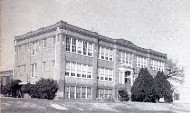




Milam County Historical Commission
Milam County, Texas
Milam County, Texas

Sheriffs of Milam County, TX
Researched and written by
Greg Kouba
Robert Hood Flanniken
# 7 - Sheriff Robert Hood Flanniken was elected on February 3, 1845 and served until
July 13, 1846.
He was one of the few survivors of that band of pioneers who began to make Milam Land
District, or as it was sometimes called, the “State of Milam County”.
He is native of Mecklenburg, North Carolina where he was born on July 18, 1819. He comes
of Irish, Scotch and Dutch ancestry.
His father, James Nobel Flanniken, was born July 6, 1795, and his mother, whose maiden
name was Eleanor A. Hood, in 1800. She was the sister of former Milam County Sheriff
Jeremiah A. Hood.
Robert H. Flanniken was reared in Russell’s Valley, Franklin County, Alabama, growing up
on a farm.
He came to Texas at the age of twenty-one, making his first stop in what was then Milam,
now Burleson County, securing work at a sawmill then in operation at a point near where
Cedar creek empties into the Brazos river.
In an 1893 interview, Mr. Flanniken stated that “I have been in Texas a good while —
longer, it seems to me, then I measure the time by the progress of events than when I
reckon it by years."
"I have witnessed the making of a great deal of Texas history, and I have known at
different times in life many of Texas’ most eminent men. Settlers were few in those
days, and I had not been here long before I knew personally every man, woman and child
within a radius of forty miles of where I first stopped."
"Whether for merit or not, it would hardly be becoming in me to say, but for some reason
or other my admiring fellow-citizens soon called me to office after I took up my
residence in this locality."
"The office of Sheriff is the one I was first called, and filled. I was made Sheriff in
the early ‘40’s, my title being Sheriff of Milam County, my bailiwick extending from the
Brazos River to the Rocky Mountains, and beyond, including the then important town of
Santa Fe, New Mexico, and my duties varying from the collection of taxes and the
execution of processes of court to the catching of runaway negroes, and the apprehension
of those who refused to pay proper respect to the laws of the Republic of Texas."
"I had a rich and varied experience as Sheriff, as you may suppose, and if you had the
patience and my wits were sufficiently collected, I could tell you a good many things
that would probably interest you. I was in the Sheriff’s office from the time I came to
the county in 1840 until the Republic was annexed — in fact, I remained in office a year
after annexation and wound up the unfinished business pertaining to the collection of
taxes."
"Then, having married, in 1846 I settled in Washington County, where I resided engaged
in farming until 1851, in which year I came again to what was then Burleson county, now
Lee, and settled — in which general locality I have since made my home."
"I have been engaged more or less in farming all these years, and have served my fellow
citizens in whatever capacities they have seen fit to call me, having passed forty of
the fifty-three years of my residence in Texas in one office or another.”
"When I was Sheriff, the system of traveling around the circuit was much more in vogue
among the lawyers than now, and I met at Caldwell, which was the seat of justice for my
bailiwick, most of the eminent legal lights in this part of the State."
Mr. Flanniken married in October 27,1846 in Washington, Texas. The lady was Miss
Margaret Ethlinda Wilson (b. Jun. 26, 1823), a daughter of Rev. Hugh V. Wilson, a
pioneer Presbyterian minister who in 1837 organized the first Presbyterian Church ever
established in Texas.
Mr. Flanniken joined the church and was an elder for many years.
He and his wife had four children, Hugh James, Robert H., Hugh Wilson Roland (adopted)
and Willie Bond Owen.
He was also a member of the Masonic fraternity, and in politics Democrat.
.


Milam County, TX
Sheriff
Robert Hood
Flanniken
.